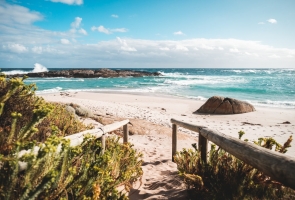Let’s face it: Not every vacation is going to be everyone’s “dream vacation.” Most of us are feeling the pinch these days but still just need to get away once in a while. Unless your agency deals specifically with focused niche markets whose members vacation regularly on Turks and Caicos, chances are that most people looking for your services are bound to some kind of budget.
This puts those of us to work within the travel copywriting and travel content marketing space in the position of delivering the most pointed and necessary kind of targeted content. Overestimating peoples’ means is an easy way to alienate them. Online buyers are interested in brands they believe to understand them and their specific needs. This is why directing your messaging to the budget-conscious crowd and getting that message right are critical.
The question then becomes: How do you do that? Fortunately, we at Beez deal with this very thing every day, and we know how to frame messaging in a way that positions your brand as an authority. We accomplish that by employing content development strategies like the ones below when creating targeted content of any kind. I’m going to list the top five that I was able to brainstorm and show you how each one relates to developing budget travel content that converts.
1. Research Seasonal Keywords
Travel is a seasonal business. High season and off-season vary by location, and targeting the right audiences at the right times is crucial to generating more bookings. The thing you don’t want to do is simply recycle last year’s keywords. The market changes constantly, and that means that, as content marketers, our messaging has to change along with it.
At least once per season (and more often is better), do some thorough research across multiple keyword planners with sensitivity to general, long-tail, and LSI keywords. Research keywords that attract traffic on each individual platform: web, social media, forums, etc. Yes, it takes some time, but the investment of time made planning out keywords will reap significant returns on that investment when done right.
2. Use Appropriate LSI Keywords
Since I brought them up, I thought I’d give a little advice on LSI keywords and how to use them. The funny part is that most marketers have been using LSI keywords for years without the slightest inkling they were doing so. They aren’t a new development in SERPs rankings, but they can be used far more strategically than they usually are.
For those not in the know, LSI stands for “latent semantic indexing,” and it refers to words and phrases that are both common to specific sites and pages and used in a completely organic way every time. LSI keywords also relate directly to other researched keywords. Here’s a quick example: Let’s say you are doing a blog series on beach destinations. Well, how many kinds of beaches are there? The LSI keywords in your blog content could look a bit like these:
• White Sand
• Black Sand
• Secluded
• Rocky
• Sandy
• Tropical
Keeping details like these in mind can help you create a network of LSI keywords that will help augment the effectiveness of more generic keywords, like “beach vacation packages.”
3. Do Accurate, Timely Research
People read your content with the expectation that you know more than they do on the subject. If you want to maintain that air of authority in all your content, accuracy is important. If you plan to cite rates and costs involved in planning a vacation, they need to be accurate. If you focus on specific attractions, you need to let readers know when those attractions are open, as many are seasonal.
Whether you think you know the information by heart, always verify before publishing content. While it’s very likely that the customer will find out about discrepancies in your content before or in the process of booking the trip, you never want them to discover inconsistencies and contradictions between what they read on your blog and what they hear sitting across your desk.
Verify important details, like costs, availability, blackout dates, when off-season starts, etc. Include as much of this information in your content as possible. This will accomplish two things: There will be fewer details to suss out when people contact you, and you will impress them with your consistency.
4. Use the Right Visuals
It’s important that the visuals you use in your content accomplish two things: provide an accurate picture of what the traveler should expect, and not drive potential business away. Sometimes the best pictures of certain destinations are the ones that other travelers have taken. Royalty-free image sites are a treasure trove of images from locations all over the world that you can legally use by simply following the site’s policies for commercial use.
Use visuals like this liberally, both within your blog and in your ads and social media posts when you can. If an image looks too polished, it will also look too expensive to some readers. Let your visuals communicate that a good vacation is within reach, and provide an honest picture of what the experience is likely to be.
5. Create Realistic Expectations
This strategy follows on the heels of the last, but I just want to paint the concept with a slightly broader brush as a parting thought.
While most people expect slight embellishments and augmentations to visuals and descriptions, especially in travel content, agents who do the legwork necessary to deliver accurate and realistic information in their blogs are the ones who find and retain the most loyal customers.
Always remember that trust-building is a foundational element to content marketing, and the concept is particularly important within the travel and leisure space. Give people realistic expectations, and the overall experience of both the trip and the help they got from you planning it will likely net you a healthy base of repeat business over time.




